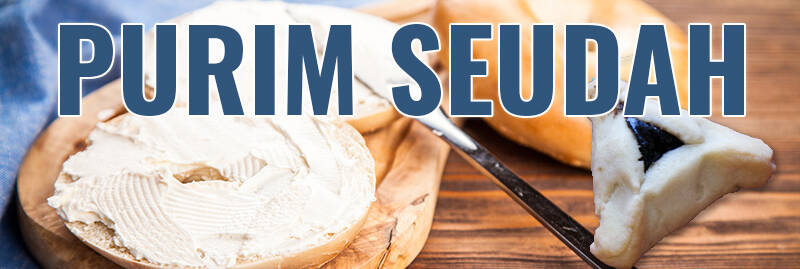
Purim Morning Seudah and Special Guest Speaker
Sunday, 24 March, 2024 • 14 Adar II 5784
8:00 AM - 11:45 AM
Join us for Shaharit at 8:00AM, the Megillah Reading followed by a wonderful Seudat Purim Breakfast.
PLEASE CLICK TO REGISTER FOR THE SEUDAH
If you would like to donate to help support this seudah, please click this link.
Donations of $180 and over will be recognized at the Seudah
INTRODUCING OUR GUEST SPEAKER, NOY LEYB:

PLEASE CLICK TO REGISTER FOR THE SEUDAH

PURIM: SUNDAY, MARCH 24
8:00 AM
Shaharit at Beth Tikvah
8:45 AM (approximately)
Megillah Reading (Breakfast to follow)
9:45 AM
Seudah Breakfast
2:30 PM - 5:00 PM
The Amazing Purim Carnival
7:00 PM
Evening Services
THOUGHTS, MITZVOT, AND TIMES FOR PURIM AT BETH TIKVAH
ADAPTED BY RABBI GROVER
“There is one nation scattered and separated among the nations whose customs and actions are different, and they are not worthy of your tolerance.”
–Megillat Esther 3:8
Haman tries to convince Ahashverosh, the King of Persia, that this different nation should not be tolerated. Haman succeeds in winning over the heart of the king and were it not for the change of events, his plan would have been actualized. Our sages teach us that within each of us there resides an aspect of Haman, of evil, which whispers to us that the one who is different should not be tolerated. The mitzvot of Purim are aimed at deconstructing these perceived differences and silencing that whisper.
Both men and women are obligated to observe four unique Mitzvot on Purim.
1) Megillah- Hearing the reading of the Megillah enables us to re-live the story recounting its messages. Men, women, and children are obligated to hear the Megillah twice; once at night and once during the day. While our readings will be livestreamed for those at risk or unable to attend, others are obligated to hear every word of the Megillah read in person from a kosher parchment.
Here at Beth Tikvah, we will read the Megillah on Saturday night, March 23rd and on Sunday morning, March 24th. The evening Megillah reading (March 23) will start at 8:30 p.m. and during Purim day (March 24), the Megillah reading is around 8:45am, (morning services start at 8am).
2) Matanot L’Evyonim - Gifts to the poor, reminds us that our possessions are in truth not fully ours. One has a responsibility to find two poor people and provide each, at the minimum, enough money for a meal. In addition to this halakhah, on Purim one should give to anyone who asks for a donation. The total giving should ideally be equivalent to or surpass the amount that one spends on his/her own Purim Meal. Money collected by Beth Tikvah this year will be going towards Leket Israel’s Matanot La’evyonim campaign. Bring your donation to Beth Tikvah, donate online, or contribute directly at matanotleevyonim.leket.org.
3) Mishloah Manot – Gifts of food to one another allows us to reach out to share our celebration of the day, and to increase love and friendship with others in the community. There is a custom to send Mishloah Manot to those who one has had particularly strained relations with over the past year. One is obligated to send two kinds of ready to eat foods to a fellow Jew to enhance their Purim meal. We do not send Mishloah Manot to those who are in mourning.
4) Seudat Purim - Celebratory Purim Meal. From a minimalist perspective, one is obligated to have a meal with bread; however ideally the meal should be a joyous festive meal, with meat (for those who eat it), and wine in an effort to help us blur distinctions that we often hold fast to. When one drinks wine he/she easily learns that what distinguishes him/her from a babbling fool is often only a few ounces of a chemical. Our community Seudat Purim will take place at breakfast following morning services.
With the exception of Megillah, which is read also at night, all of the mitzvot should only be performed during the day of Purim.
In addition, the Fast of Esther ends on Erev Purim at 6:44 p.m. The only restriction of the fast is eating and drinking. One may bathe, shave and enjoy live entertainment as usual. However, as with all fasts, it should be used as an opportunity for introspection and personal growth. Our sages have taught that only one who experiences the fast of Esther can truly celebrate on Purim.
Sorry, Registration has ended.
| Share Print Save To My Calendar |
Tue, 21 October 2025
29 Tishrei 5786
Service Times
Today's Calendar
: 7:30 am |
: 12:00 pm |
: 7:00 pm |
Friday Night
: 6:00 pm |
| Candle Lighting : 6:02 pm |
Shabbat Day
: 9:00 am |
: 6:00 pm |
| Havdalah : 7:00 pm |
Upcoming Programs & Events
Oct 21 |
Oct 22 |
Oct 22 |
Oct 22 |
Oct 23 |
This week's Torah portion is Parshat Noaẖ
| Shabbat, Oct 25 |
Candle Lighting
| Friday, Oct 24, 6:02 pm |
Havdalah
| Motzei Shabbat, Oct 25, 7:00 pm |
Rosh H̱odesh H̱eshvan
| Wednesday, Oct 22 |
Join Our Mailing List
Update this content.
Beth Tikvah Synagogue | 3080 Bayview Avenue, Toronto, Ontario M2N 5L3 Canada | Phone: 416 221 3433
Privacy Settings | Privacy Policy | Member Terms
©2025 All rights reserved. Find out more about ShulCloud
